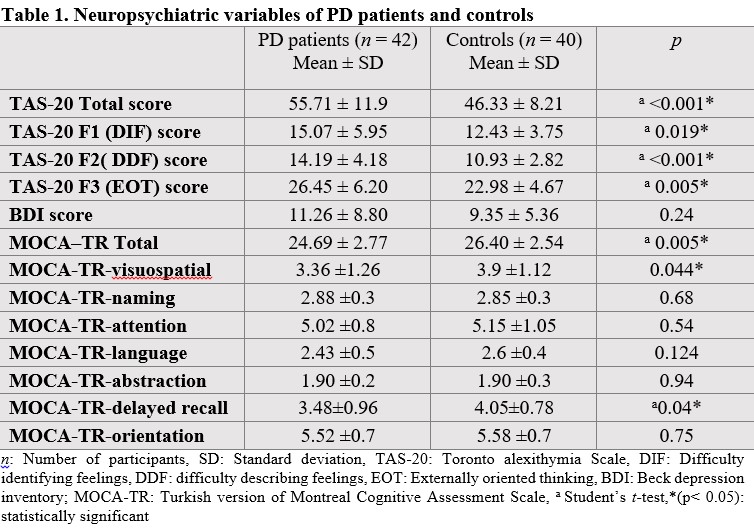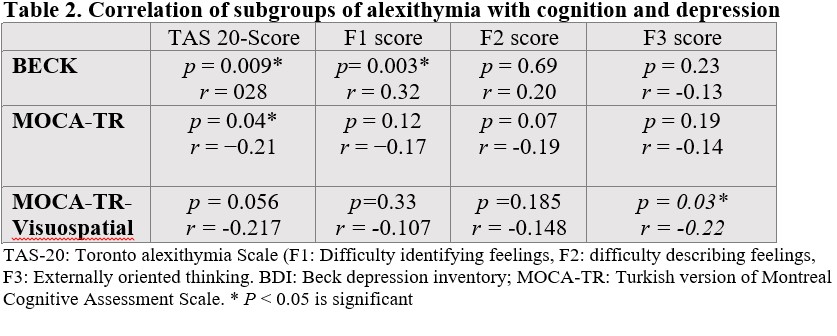Category: Parkinson's Disease: Cognitive functions
Objective: The aim of our study is to examine the relation of alexithymia with cognition and depression in non-demented patients with Parkinson’s disease (PD).
Background: Alexithymia is defined as the inability to recognize and verbalize emotions. Basal ganglia are connected to dorsal prefrontal and orbitofrontal structures, which have an important role in emotional experience. There is little known about alexithymia and cognitive dysfunction and its relationship with depression.
Method: Fifty consecutive non-demented patients PD and 50 healthy controls were enrolled in the study. The Turkish version of the Montreal Cognitive Assessment scale (MOCA-TR), 20-item Toronto Alexithymia Scale (TAS-20) (F1, F2, F3 subgroups), and Beck Depression Inventory (BDI-I) were used to evaluate cognitive functions, alexithymia, and depression, respectively, in both groups.
Results: The total TAS-20 score was 55.71±19 in the PD group and 46.33±8.21 in the control group. There was a statistically significant difference in the total TAS-20 scores between the groups (p<0.001). In subgroups of alexithymia, all mean scores of F1, F2, and F3 were higher in the PD group (p=0.019, p<0.001, and p=0.005, respectively). In the MOCA-TR test, the mean scores in visuospatial and delayed recall of patients with PD were statistically lower than in the control group (p=0.044 and p=0.04, respectively) (Table 1). The MOCA-TR and BDI total scores were significantly correlated with TAS-20 total scores. In subgroup analysis, we only found an association between the visuospatial domain of MOCA-TR and the F3 subgroup of TAS-20 (r= -0.22, p=0.03) (table 2). There was no relation between alexithymia and disease duration or total levodopa dose (p<0.05).
Conclusion: Alexithymia is not a rare symptom and may be accepted as one of the preceding non-motor symptoms in PD. Dopamine depletion in the anterior cingulate cortex (ACC) and orbitofrontal cortex of the frontal lobe, areas important for emotional cognition, maybe the underlying reason in alexithymia. Memory functions are not correlated with alexithymia, but, in contrast to previous literature, we suggest that F3, the cognitive domain of alexithymia, may be associated with visuospatial function and may originate from a wider area than the ACC.
References: Assogna, F., et al., Alexithymia in Parkinson’s disease: A systematic review of the literature. Parkinsonism Relat Disord, 2016. 28: p. 1-11. Bogdanova, Y. and A. Cronin-Golomb, Alexithymia and apathy in Parkinson’s disease: neurocognitive correlates. Behav Neurol, 2013. 27(4): p. 535-45. Costa, A. and C. Caltagirone, Alexithymia in Parkinson’s disease: a point of view on current evidence. Neurodegener Dis Manag, 2016. 6(3): p. 215-22.
To cite this abstract in AMA style:
G. Kenangil, M. Demir, E. Tur, F. Domaç. Alexithymia, Depression, and Cognition in Patients with Parkinson’s disease [abstract]. Mov Disord. 2020; 35 (suppl 1). https://www.mdsabstracts.org/abstract/alexithymia-depression-and-cognition-in-patients-with-parkinsons-disease/. Accessed February 3, 2026.« Back to MDS Virtual Congress 2020
MDS Abstracts - https://www.mdsabstracts.org/abstract/alexithymia-depression-and-cognition-in-patients-with-parkinsons-disease/


